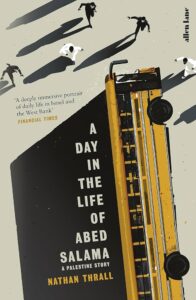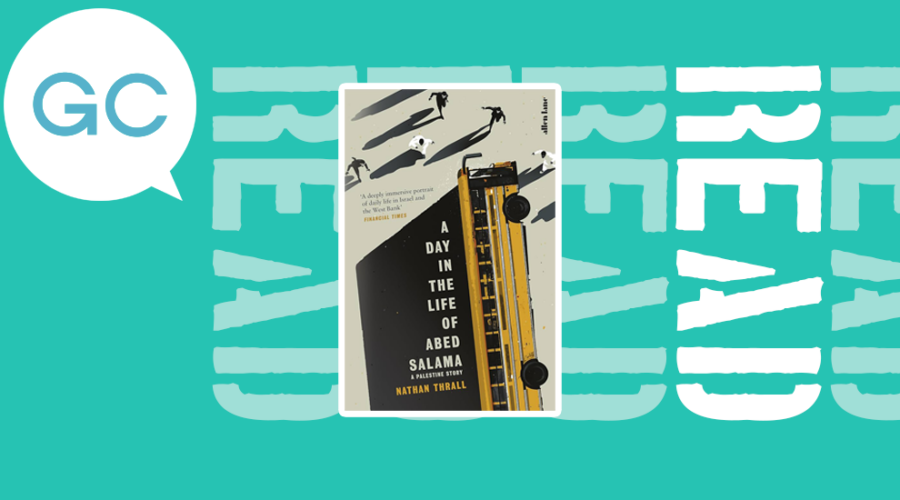Thrall is masterful in situating this personal story within the broader context of political conflict, offering readers an intimate yet far-reaching perspective on the human cost of the Israeli-Palestinian struggle.
 The story unfolds on a crisp February morning in 2012, when Milad, a bright and spirited five-year-old, eagerly boards a school bus for a field trip — a rare moment of excitement in the constrained life of a Palestinian child living in the occupied West Bank. However, the day takes a harrowing turn when the bus crashes, claiming the lives of several children and leaving others critically injured.
The story unfolds on a crisp February morning in 2012, when Milad, a bright and spirited five-year-old, eagerly boards a school bus for a field trip — a rare moment of excitement in the constrained life of a Palestinian child living in the occupied West Bank. However, the day takes a harrowing turn when the bus crashes, claiming the lives of several children and leaving others critically injured.
Abed Salama’s desperate search for his son amidst the chaos becomes the heart of the narrative, revealing the layers of systemic dysfunction and neglect that exacerbate the tragedy.
Through meticulous reporting and vivid storytelling, Thrall captures the physical and emotional toll of Abed’s journey. As Abed traverses checkpoints, navigates bureaucratic hurdles, and contends with the indifference of authorities, the reader is drawn into the labyrinthine realities of Palestinian life under occupation.
Thrall’s detailed descriptions of Abed’s frustration and anguish offer a visceral understanding of the obstacles that define Palestinians’ daily existence in the West Bank.
Yet, this is not merely a story of one man’s grief. Thrall broadens the lens to explore the structural inequalities that underpin the Israeli-Palestinian conflict.
The book delves into the segregated infrastructure, where roads, hospitals, and legal systems differ drastically depending on one’s nationality and ethnicity. For instance, the lack of access to adequate emergency services and the delays caused by checkpoints compound the tragedy, turning what could have been a straightforward rescue mission into a prolonged ordeal.
These elements highlight the dehumanizing impact of the Israeli occupation, making the personal political and vice versa.
Thrall’s narrative is further enriched by the voices of other characters, from Milad’s teachers and fellow students to the first responders and hospital staff who grapple with the aftermath of the accident. Each perspective adds depth to the story, illustrating how individual lives intersect with larger historical and political forces.
The inclusion of these diverse voices ensures that the book is not solely about Abed’s loss but also about the collective struggles of a community striving to endure under relentless adversity and occupation.
What sets A Day in the Life of Abed Salama apart is Thrall’s ability to blend rigorous journalism with profound empathy. His writing is neither sensational nor detached; it is deeply humanizing. Thrall avoids the trap of reducing his subjects to mere symbols of suffering, instead portraying them as complex individuals with dreams, flaws, and resilience. This approach invites readers to connect with the story on a personal level, fostering a deeper understanding of a conflict often perceived through the lens of statistics and headlines.
The stark portrayal of systemic inequities and personal loss may be difficult for some readers to confront. However, it is precisely this unflinching honesty that makes the book so impactful. By shedding light on the often-overlooked human dimension of the Israeli-Palestinian conflict, Thrall encourages readers to move beyond simplistic narratives and engage with the complexities of a deeply entrenched issue.
A Day in the Life of Abed Salama is more than just a recounting of a tragic event; it is a poignant and necessary reminder of the enduring cost of conflict and the resilience of those who live through it. For readers seeking to understand the realities of life under Israeli occupation, or for those simply drawn to powerful stories of love, loss, and survival, Thrall’s book is an essential read. It challenges, enlightens, and ultimately leaves an indelible mark, urging readers to consider the lives behind the headlines and to empathize with the humanity that connects us all.
The first draft of this review was generated by AI, after which it was edited and crafted by the named author.

